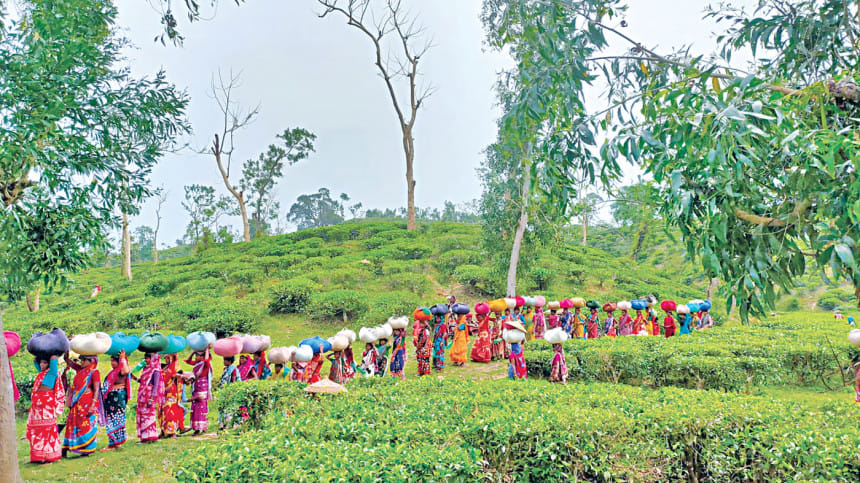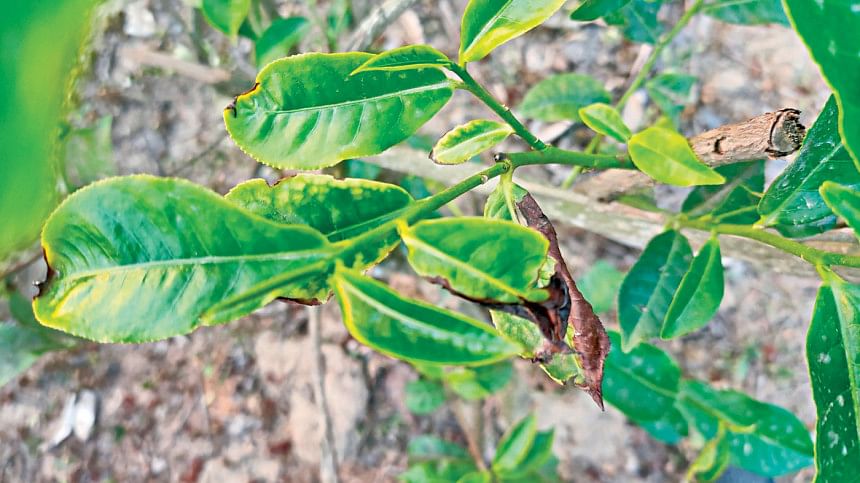Extreme heat hampering tea production

Tea farmers in Bangladesh are concerned about seeing lower yields this year as much of their trees have been afflicted by various diseases and pests amid the ongoing heatwave and insufficient rain.
With this backdrop, experts suggest that farmers irrigate their fields rather than wait for rainfall in order to restore the normal growth cycle.
Mujibur Rahman, an assistant of the Bangladesh Meteorological Department in Sreemangal upazila of Moulvibazar, said local temperatures were as high as 38 degrees Celsius in the third week of April.
"Such extreme heat leads to health issues for humans and plants alike," he added.
Rahman also said temperatures in the region have been hovering around 35 degrees Celsius, which is much higher that what tea trees can tolerate.
As a result, buds that manage to take hold are turning pale while some trees are seeing their leaves drop before even reaching this stage.
Besides, production will definitely decrease if the plants do not get enough water through either natural or artificial means, he added.
Shamim Ahmed Chowdhury, manager of Shirajnagor Tea Garden, said another issue is that red spider mites are spreading as the hot and dry weather creates ample ground for them to multiply.

The pests feed on tree sap, meaning that there is little left to carry nutrients to its leaves. As such, the plants begin to wither before eventually dying out.
Heat stress is also to blame for the lack of buds as the plants become afflicted with fungal diseases that prevent healthy growth.
Another reason is the invasion of loopers, which are caterpillar larvae of different moth species that feed on the leaves.
"But if the excessive heat cools down through rainfall, then these problems will be gradually fixed," Chowdhury said, adding that farmers could also apply pesticides.
Jahar Tarafder, member secretary of the Tea Planters and Traders Association of Bangladesh, said many trees are dying amid the ongoing drought.
"The industry will be in a dire situation if this continues for long," he added.
Tarafder went on to say that while 70 per cent of the tea trees had buds by this time last year, less than 20 per cent are currently budding.
Golam Mohammad Shiblee, chairman of the Sylhet chapter of the Bangladesh Tea Association, a platform of tea garden owners, said the local tea industry completely depends on rain.
Tea plantations need at least 5 to 7 inches of rain from January to March but such volumes were not seen this season, he added.
Dr Rafiqul Haque, director of the project development unit of Bangladesh Tea Board, said tea plants can thrive under conditions of 30 to 32 degrees Celsius while yields become moderate when temperatures reach 34 degrees Celsius.
"But production is almost completely gone when temperatures exceed 35 degrees Celsius," he added.
Haque then said they are advising tea farmers to provide mulch under new seedlings while also ensuring irrigation so that the plants are nourished properly.
In addition, they advise farmers to plant their trees in shade and at least 20 feet apart to ensure proper growing conditions.
The tea industry had faced losses due to labour unrest last year and now the effects of climate change could do the same this year, he added.
According to the Bangladesh Tea Board, 9.38 crore kilogrammes of tea was produced by 167 gardens across the country in 2022, down 3 per cent from 9.65 crore the year before.
This year, the production target is 10.20 crore kilogrammes from more than 2.85 lakh acres of land.

 For all latest news, follow The Daily Star's Google News channel.
For all latest news, follow The Daily Star's Google News channel. 








Comments